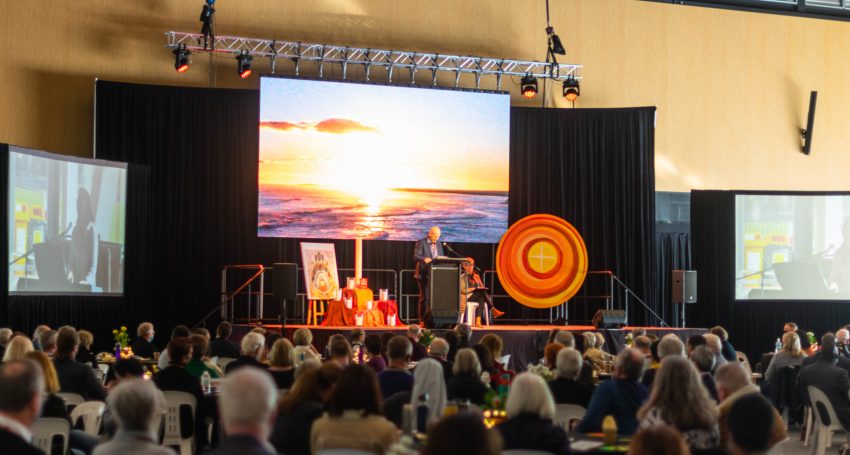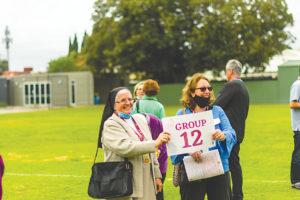Moment of grace
Opinion
A central aspect of our faith is that the human person is made for communion; communion with God; communion with our sisters and brothers; communion with our deepest self and communion with the whole of creation.

Notice the important connective word ‘with’. Sin is where this communion becomes strained, broken, ruptured, misses the mark, stretched. Grace is that which continually and unceasingly draws us back into communion. Each person and community’s story is the interplay of these two things. Spoiler alert! Grace wins in the end.
I write these few words just after the first night and day sessions of our recent Diocesan Assembly and before our concluding session a few days later. My deep thanks to our organising team for providing such a powerful experience.
Advertisement
 My experience, so far, is that it is a moment of grace for us. Every person I met had been touched by this grace. Each had allowed the grace of their baptism to be renewed. Each was more in touch with the call of God, and the call to service and of fostering this communion.
My experience, so far, is that it is a moment of grace for us. Every person I met had been touched by this grace. Each had allowed the grace of their baptism to be renewed. Each was more in touch with the call of God, and the call to service and of fostering this communion.
People spoke of the joy of being able to come together as a Diocesan family; of the ability to speak of, and to, their deep concerns for the Church and the world. People expressed their desire to deepen our Catholic identity. Such things speak to what we innately know as missionary disciples of Christ, namely, that we are made for communion and are at our best when we are drawn into that four-fold communion. No wonder the Church is called the ‘Body of Christ’. St Augustine often would remind us that this term describes both that which is on the altar and those who are around the altar.
People also spoke of those things that fracture, that draw us away from this communion. Sadly there are many, and while this will always be the case in this world, seeking to reduce the number will always be our mission. Thankfully the gathering was a safe environment in which hurts, sadness, disappointments as well as the joys and hopes of each could be expressed.
Much has happened in our world since the end of the Second Vatican Council in 1965. The Council is, and shall remain, the guiding vision of all that we seek to be and do. These days great attempts are made to define us as ‘consumers’, isolated from one another, accountable only to ourselves, rather than being members of a society, a community. The atomisation of life gains pace every day. It seems that God is more and more marginalised in our society and this affects the way we see ourselves. Negotiating our path through this life is not the easiest or simplest thing to do.
What then stops us from ending up in ideological cul-de-sacs? What makes sure we do not fall into the trap St Paul speaks of in 1 Corinthians 3:
‘I follow Paul,’ and another, ‘I follow Apollos,’ are you not mere human beings? The one who plants and the one who waters have one purpose, and they will each be rewarded according to their own labour. For we are co-workers in God’s service; you are God’s field, God’s building.’
By the grace God has given me, I laid a foundation as a wise builder, and someone else is building on it. But each one should build with care. For no one can lay any foundation other than the one already laid, which is Jesus Christ.
So then, no more boasting about human leaders! All things are yours, whether Paul or Apollos or Cephas or the world or life or death or the present or the future – all are yours, and you are of Christ, and Christ is of God.’
The answer is thus two things: The Holy Spirit and a spirituality of communion.
St Pope John Paul wrote in his 2001 Novo Millennio Iuentne:
To make the Church the home and the school of communion: that is the great challenge facing us in the millennium which is now beginning, if we wish to be faithful to God’s plan and respond to the world’s deepest yearnings. He spelt out what that means:
Advertisement
‘Before making practical plans, we need to promote a spirituality of communion, making it the guiding principle of education wherever individuals and Christians are formed, wherever ministers of the altar, consecrated persons, and pastoral workers are trained, wherever families and communities are being built up. A spirituality of communion indicates above all the heart’s contemplation of the mystery of the Trinity dwelling in us, and whose light we must also be able to see shining on the face of the brothers and sisters around us. A spirituality of communion also means an ability to think of our brothers and sisters in faith within the profound unity of the Mystical Body, and therefore as ‘those who are a part of me’. This makes us able to share their joys and sufferings, to sense their desires and attend to their needs, to offer them deep and genuine friendship. A spirituality of communion implies also the ability to see what is positive in others, to welcome it and prize it as a gift from God: not only as a gift for the brother or sister who has received it directly, but also as a ‘gift for me’. A spirituality of communion means, finally, to know how to ‘make room’ for our brothers and sisters, bearing ‘each other’s burdens’ (Gal 6:2).’
The graced moment of the Diocesan Assembly is such an experience for our Archdiocese. My prayer and hope for the coming Plenary Council and the Church-wide Synod of Bishops in 2023, inspired by the Holy Spirit and the servant leadership of Pope Francis, is that it will be something of the same.
God is good, good indeed.











Comments
Show comments Hide comments